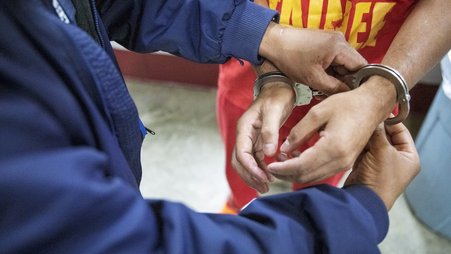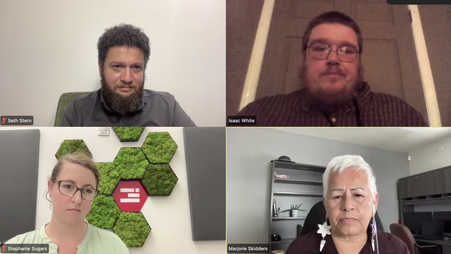The award-winning documentary “Bad Press” told the story of journalist Angel Ellis and her colleagues' fight to protect press freedom in the Muscogee (Creek) Nation, a Native American tribe based in Oklahoma.
It was one of a handful of tribes to codify protection for press freedom. And Mvskoke Media, the outlet Ellis works for, took full advantage of its rights, publishing the kind of critical reporting on tribal government that is sorely needed elsewhere in Indian Country.
But then the tribe’s lawmakers decided to repeal the Free Press Act, a move that allowed the tribal government to oversee and interfere in Mvskoke Media’s editorial decision-making, and withhold funding if it didn’t like the outlet’s content.
You can (and should) watch the film on The Criterion Channel for the rest of the story (use the code BadPress24 for a 20% discount). But the struggle for a free press on tribal land is by no means limited to one tribe or one outlet.
There's just no clear cut path to go into any of our tribal communities and accurately report on issues that could really raise the quality of life for our people.
We hosted an X Space conversation last week with Ellis, as well as Becca Landsberry-Baker, executive director of the Indigenous Journalists Association and Muscogee (Creek) Nation citizen, and Jodi Rave Spotted Bear, executive director of the Indigenous Media Freedom Alliance and citizen of the Mandan, Hidatsa and Arikara Nation.
Ellis explained that the development of press freedom protections on tribal land are, to an extent, in its infancy. “Reporting on indigenous issues is not emerging, but protecting it by policy is,” she said. “The most significant challenge for indigenous press freedom right now … is really access to information and having the safe space to advocate for good press freedom policy.”
Spotted Bear agreed, noting the absence of laws to ensure government records and meetings are open to the public. “There's just no clear cut path to go into any of our tribal communities and accurately report on issues that could really raise the quality of life for our people.”
That tribal citizens are also U.S. citizens protected by the First Amendment does not resolve the need for protections at the tribal level. First of all, tribal media outlets are usually dependent on tribal government for funding. “It's very hard to compete with the established news ecosystem for independent money. It's very hard to get,” Ellis explained.
She added, “I could go out and I could try to sell advertising to businesses, but they look at me and they say, hey, I'm trying to sell Ford pickups here. Why would I put an ad in your paper when I don't think the people who read your newspaper have enough money to buy my pickup?”
Seeking traditional legal remedies also poses challenges. “Can I appeal to the federal government as an American citizen, say that this tribe has violated my rights? Yes, it can be done, but you will be a pariah in your own community. Culturally speaking, you're going to be the person who has brought a federal suit against your family, basically,” Ellis said.
Further complicating things, Spotted Bear noted that each tribe is different. In her tribe, it’s more common to appeal to outside courts due to the lack of an independent tribal judiciary. But people attempting to do so are frustrated by seemingly never-ending inquiry about whether they’ve sufficiently exhausted their remedies at the tribal level first.
There are cultural issues in addition to legal ones, especially when it comes to contemporary notions of objectivity in journalism. Ellis used the example of a meeting followed by a meal: a mainstream journalist might skip the meal to retain their neutrality, but it’s “really rude not to [eat] in our community – if you’re coming to the meeting and there’s food, you’d better sit and eat, or else you’re pretty snobby.”
Every time an elected official of our tribe came to a community meeting to campaign, they were asked about press freedom, and they couldn't ignore it.
In Ellis’ view, connecting with communities she covers “enforce[s] that relationship of, hey, I'm a journalist, and I work for you to tell your story.” It’s a contrast from mainstream journalists who sometimes “come into a community, take some notes, take some names, and bounce the fuck out.”
While hesitating to disparage her colleagues, she noted that “the big consensus out there … as [to] what stories get precedence, and what stories get told is the only time mainstream cares about the reservation is when there's a big, sexy, scandalous story. Is the chief in handcuffs? They will show up then.”
Landsberry-Baker also highlighted the difference between tribal journalists who are accountable to their fellow citizens and outside journalists who are accountable to their news outlet. “You're able to do more nuanced coverage if you're a part of that community, because you know the tribal citizens, you know what your work is impacting. You know the stories, you know the history, you know the culture,” she said.
But tribal journalists need to balance that with the reality that many in the journalistic establishment – as well as law enforcement officers tasked with distinguishing journalists from activists – might not see it that way.
Bad Press was intended to show other tribal journalists a path toward overcoming the obstacles they face without relying on either U.S. courts or mainstream journalists. “We appealed to the community …Every time an elected official of our tribe came to a community meeting to campaign, they were asked about press freedom, and they couldn't ignore it. And so I think that when you talk about really advocating for good policy in Indian Country, it kind of starts and stays in the tribe,” Ellis explained.
But the film is relevant to all journalists and others who value press freedom, native or not. Landsberry-Baker called it a “beautiful tribute to the boots on the ground journalists.”
Ellis hopes the film will inspire all journalists to advocate for their own rights. Journalists “cannot be complicit in our own demise,” she said. “You can’t be a journalist without advocating for [press freedom], because that’s the world we live in.”
You can listen to the whole conversation here, or read an (imperfect AI-generated) transcript here, even if you don’t use X.





